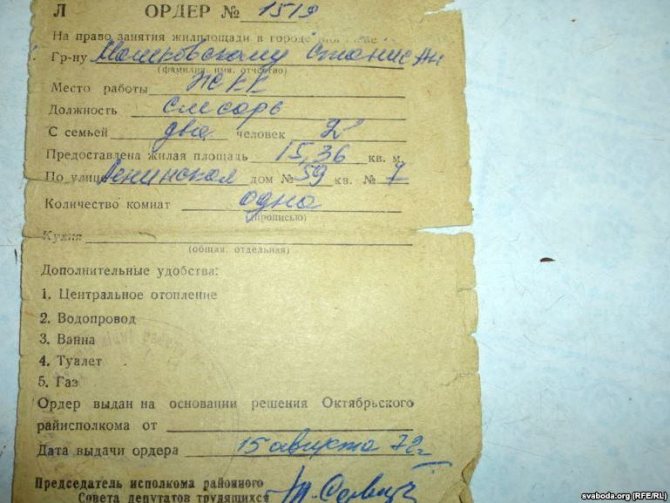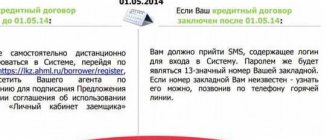Concept
During the Soviet era, a warrant was the only document that could confirm a person’s right to live in living space issued by the state.
By the way, even now large and young families can get an apartment from the state.
At the moment, the document has completely lost its force, since after the collapse of the Soviet Union it was replaced by other legal forms (tenancy agreement, home purchase agreement, etc.).
Despite the loss of relevance, it is difficult to carry out a number of important legal operations without a document. Thus, it will be much more difficult for a citizen to carry out privatization if he does not provide the appropriate warrant (see also - what other documents are needed for privatization).
A warrant is a certificate issued in the name of the person who disposes of the living space within the framework of certain laws of the USSR. In addition to responsibility, the document identifies citizens registered in this premises.
Document classification
There are four types of orders in total. Each of the classes is necessary to solve certain types of questions:
- Official . It was given to a person who moved into a service apartment for the duration of work or a business trip. It had a limited validity period, which was stated in the document;
- Temporary . The purpose was similar to the official one, but provided more extensive rights to use housing. Issued for a period of up to 30 days or until the end of a certain period (for example, the end of the school year).
The two apartment orders presented above are currently completely excluded from the document flow. They cannot be used for the purpose of privatization of housing or other legal actions.
The following two orders are found during certain operations, in particular during the privatization of living space:
- Inspection - provided by the state to inspect potential housing. The document is current and is issued when the future owner of the apartment inspects the property;
- Exchange - issued for persons wishing to exchange living space with the permission of the executive committee.
Help form
The inspection document is a one-page certificate that is issued at the city hall. The warrant contains information about the citizen who is conducting the inspection, address, area of housing and number of rooms.
Important: It is necessary to distinguish between an acceptance certificate and an inspection warrant. Signing the last document does not impose an obligation on the person to accept housing.
The document is valid for 5 days. During this time, the citizen must decide whether to accept the apartment provided or refuse, indicating the reasons. If the person agrees, the city administration begins the procedure for issuing the main occupancy order.
The form of the document for moving in is similar to the inspection document. The following information is provided here:
- Employer information;
- Number of people moving into the apartment;
- Information about each family member;
- Information about living space (number of rooms, area, etc.).
In this case, one part of the order is stored directly in the hands of the owners, and the other in the archives of the city hall.
The need for a warrant in modern Russia
The need for a document depends on the type of housing:
- For privatized apartment, a certificate is not needed, since it is replaced by a certificate of ownership.
- For municipal , the need for a warrant is also questionable. For this type of property, a separate package of documents has been established: a social lease agreement, an agreement for free operation, etc.
Note: The only situation where a warrant may be required is the privatization of residential premises. In this case, the presence of a document speeds up the paperwork several times.
Registration of an order
The updated Housing Code of 2005 officially replaced warrants with contracts, which lawyers divide into 3 types:
- Commercial agreement (purchase and sale);
- Social contract;
- Agreement on free use of living space.
In the USSR, when all residential premises were owned by departments, social rental agreements were concluded by organizations providing their workers with housing, and not by the citizens themselves. The order was issued by the executive committee and was an official confirmation of the fact of moving into the housing. Currently, all non-privatized apartments are located in municipalities, which is why there is no need for two identical documents.
It is impossible to obtain a warrant after 2005 in modern Russia, however, if the certificate is issued before the specified date, the document remains legally valid, so it will not be superfluous to store it.
Note: If there is such a certificate for housing, the owner must have another document in his hands - a social rent agreement. It is on its basis that the owner’s rights to the apartment can be confirmed.
What is an apartment warrant and how to apply for it
- a social contract is an agreement that implies that people are obliged to completely renounce their sovereign rights in favor of the state in order to ensure their interests with its help;
- commercial lease agreement - according to this document, one of the parties is obliged to provide an apartment or a private house for a fee for possession or use for comfortable living during the term of this agreement;
- agreement on free use - based on Art. 689 of the Civil Code of the Russian Federation, according to the document, a person undertakes to provide the borrower with living space for temporary use.
- A service order is a document that was drawn up before privatization. People could only receive it on behalf of the company in which it was registered. A citizen had the right to housing only if he continued to work, otherwise his rights to an apartment could easily be taken away from him. Therefore, the document had a short-term perspective.
- An exchange order is an order that was received when exchanging a home. The exchange requires confirmation from the executive committee.
Please note => Discharge from the apartment without consent by court
Restoring a lost certificate
Despite the fact that orders are everywhere being replaced by various contracts, their loss significantly slows down the procedure for privatization of living space, which is why some citizens need to restore the document.
Note: It is highly recommended that you begin recovering a document immediately after it is lost. This process is not difficult, however, it requires some time for bureaucratic operations.
The procedure for restoring a lost document consists of 3 stages:
- Visit to the repair and maintenance department . You must request a special coupon from the institution. If he is absent from the authority, then the manager is obliged to issue a certificate that officially confirms the fact of the loss;
- Contacting the district administration at the location of the residential area. At the authority, you need to fill out an application, which sets out a written request to begin concluding an agreement for renting premises for housing. When filling out a tenancy agreement, you should engage a housing lawyer. If the city administration decides to refuse a person, he has the right to appeal to the courts;
- The final authority will be the real estate department of the area where the housing is located. If this institution could not help, then the only option is a one-stop service, whose task is to monitor the immediate recovery of the document.

In addition to the above method, you can prove ownership of an apartment by accessing the archives located in the local administration. It contains not only information about the owner of the apartment, but also copies of the certificate and social tenancy agreement. When filling out an application, the local administration is obliged to provide the documents requested by the person.
Note: The administration does not have the right to issue a duplicate of the order, since it is not stated in the regulations of the Russian Federation. The citizen receives a document indicating a certificate on the basis of which he has the right to live in the living space.
Regarding the restoration of lost documents in court. All information about citizens registered in an apartment is stored in house registers, FMS authorities, etc., so returning the data through the court will not be difficult.
How and when can you get a warrant for an apartment?
If the company that owns the building draws up the documents correctly, the owners will not have problems due to a lost warrant. But in reality, mayors do not adhere to this order in conducting their affairs. You can draw up an agreement for free use or social rental. Each of them must contain information about the address of the apartment and its area. Data about all family members registered in the home is also entered there. This document is indispensable when privatizing real estate . It can only be issued in the name of the official tenant of the premises, who is entrusted with sole responsibility. It includes everyone who lives in the apartment at the time the tenant moves in. It should be understood that before actual check-in, a citizen must be given an inspection warrant; it consists of one page with a tear-off coupon. He remains on the executive committee. And the paper itself contains the person’s last name, first name, patronymic, and the address of the apartment that he will need to inspect before moving in.
22 Dec 2020 marketur 385
Share this post
- Related Posts
- What documents are needed for a tax deduction for medical implantation services?
- Certificate of ownership of an apartment sample
- Up to what age is considered a Young Specialist according to the Labor Code of the Russian Federation
- What to do if your marriage certificate is lost
Warrant and privatization
The most common reason why a person needs a warrant is privatization. In this case, all documents for housing are submitted to the local administration, and in return an agreement is concluded between the person and the authorities on the transfer of ownership of the apartment. During this operation, documents such as a warrant and a social tenancy agreement completely lose their legal purpose.
Despite the fact that the administration requires the delivery of the warrant, its loss does not prevent the person from privatizing the apartment. The owner just needs to write a statement about the loss, after which local authorities will independently find the information in the archives.
But in the event of loss of a social tenancy agreement, it is subject to mandatory restoration, since it is a mandatory document confirming the legal rights of a citizen to privatize residential premises.
Note: Often officials play it safe and refuse a citizen an agreement without a warrant. The dispute can be resolved in two ways - in court or by re-issuing the document.
Inspection warrant
When moving due to reconstruction in the city of Odintsovo, we were offered one inspection warrant for 2 rooms (58.2 sq.m.) and 1 room (41.8 sq.m.) apartments. There are 7 of us in a 2-room municipal apartment (my parents are disabled indefinitely, I and my son (2 years old), my brother, his ex-wife (divorced for more than 3 years) and their 8-year-old daughter). Tell me, are our rights being violated? Is it legal for us to combine 2 apartments into one inspection order (because if we give separate orders, then only 2 people can enter 1 room apartment (in our city the norm is from 14 to 18 sq.m. per registered person), and 2 5 people no longer pass through the apartment (5*14=70)). Having issued a general order for 2 apartments with a total area of 100 sq.m. (sort of like 7*14=98 and how they tell us that nothing has been broken). Only it turns out that when registering there will be 2.5 people in one apartment and 4.5 in another? I own an apartment in a building that is being demolished. I received an inspection warrant for a new building, which has not yet been accepted by the state commission, but inspections are already underway and the Department needs to give an answer now. If I agree to the proposed option, when will the exchange agreement be concluded and when can my ownership of the new apartment be formalized?
Please note => How to pay a traffic fine through Sberbank online
Obtaining two or more certificates for an apartment
Due to the lack of legal force in orders for an apartment, there is no need to obtain such documents. However, if a person has several close relatives, between whom the living space needs to be divided, the person may receive several orders.
To do this, it is necessary to change the status of the apartment to communal, dividing bills, area, etc. between family members. The procedure is carried out in court and requires a lot of time.
In the case of a privatized apartment, the living space must be divided into several shares, the number of which corresponds to the number of future owners. After this, each citizen registers the area allocated for him with all the accompanying documents (including the warrant).
Warrant for apartment
- The social tenancy agreement is in the original.
- Passports of family members, birth certificates of children under 14 years of age. Also – documentation confirming the relationship.
- Application for participation in the procedure or refusal to participate in it - from family members registered at the place of residence.
- An extract from the apartment register about persons registered at this address.
- A statement from each participant about not using the privatization opportunity earlier, since it is provided once.
- Cadastral passport and technical documentation for the object from Rosreestr and BTI certificates.
Please note => Sample application for the resettlement program for compatriots for Kazakhstanis
An equally significant role is played by the designated document when re-registering ownership, which is based on the provisions of the Law on Privatization No. 1541-1 of July 4, 1991. The same problems arise here with determining legal capacity as when drawing up an agreement.






